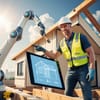Artificial intelligence (AI) is transforming the real estate industry by significantly reducing construction costs, project timelines, and delays, ultimately benefiting homebuyers. According to Jay Shah, founder of Kaizen AI, AI can cut construction costs by 20-25% and shorten construction timelines by 40-50% for high-rise projects.
By optimizing project blueprints, AI minimizes delays and wastage, leading to lower construction costs. Developers can then pass these savings on to homebuyers, making housing more affordable. AI-driven optimization also streamlines project planning and execution, reducing construction timelines. For instance, AI helped reduce the construction timeline of the Marriott Executive Apartments in Navi Mumbai from five years to just three.
AI can also increase the usable space in apartments by optimizing their design. In one project, AI optimization increased the carpet area of apartments by over 1 lakh sq ft. Additionally, AI-powered predictive analytics can forecast project delays, allowing managers to adjust resources in real-time and prevent costly overruns.
Furthermore, AI-powered computer vision tools can review live site footage to spot missing safety gear, blocked walkways, or unsafe behavior, reducing accidents and strengthening compliance reporting. This technology has the potential to revolutionize the construction industry, making it safer and more efficient.
By leveraging AI, developers can unlock stuck projects by reconfiguring designs within existing constraints, making developments profitable for developers while ensuring long-delayed homes are delivered to homebuyers. AI can also optimize resource allocation, mapping labor, machinery, and materials against project demands, giving managers clear recommendations on resource allocation.
Overall, the integration of AI in the real estate industry has the potential to bring about significant benefits for both developers and homebuyers, making housing more affordable and construction more efficient.


